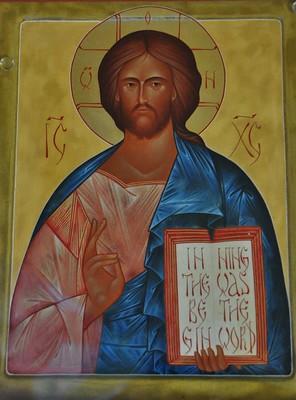In Him we have redemption through His blood, the forgiveness of sins, according to the riches of His grace which He made to abound toward us in all wisdom and prudence, having made known to us the mystery of His will, according to His good pleasure which He purposed in Himself, that in the dispensation of the fullness of the times He might gather together in one all things in Christ, both which are in heaven and which are on earth – in Him. In Him also we have obtained an inheritance, being predestined according to the purpose of Him who works all things according to the counsel of His will, that we who first trusted in Christ should be to the praise of His glory. (Ephesians 1:7-12; emphases added)
St Paul is very clear that all things will be unified in Christ in the eschaton. All things – including everything in heaven and on earth – are to be gathered together and found in Christ the Savior. St Maximus the Confessor gives us a possible explanation for how this can happen. Basically for Maximus Jesus Christ is the Word of God (Greek: Logos). According to St John the Theologian, Christ the Logos is the creator of the universe. In the beginning was the Word, and the Word was with God, and the Word was God. He was in the beginning with God; all things were made through him, and without him was not anything made that was made (John 1:1-3). We confess this belief in the Nicene Creed – “And in one Lord, Jesus Christ … by whom all things were made.” As the Creator of all things, it is Christ who gives purpose and principle (Greek: logoi) to each and everything thing that exists. The logoi in each created thing are Christ’s presence in every aspect of the cosmos and ultimately connect everything that exists to the Logos. All created things thus by nature have the Logos in them in and through the logoi which Christ the Logos has bestowed on every created thing. [Maximus uses the term ‘intelligible’ to signify what we might call the spiritual and he uses the ‘sensible’ to signify the material/physical. Sensible and intelligible belong together as we find the spiritual – logoi – in every physical thing that exists because Christ the Logos has placed the logoi in all things He created].
“In essence , the logoi are that which is intelligible in the sensible realm. That is, the logoi are what give meaning to the material reality that we experience. Perceived by the mind rather than the senses, the logoi are reflections of the divine Logos, and therefore in contemplation the logoi refer us ever onward to God. ‘When the mind perceives in contemplation the principles [logoi] of the things that are, it will end in God himself, as the cause and beginning and end of the creation and origin and as the everlasting foundation of the compass of the whole universe.” The logoi the are the heart of Maximus’ entire worldview.
The world has meaning because Christ the Logos has put meaning in everything in the world when He created it. The purpose or principle (logoi) of each thing is what we are trying to discern and decipher about the universe. So just learning the natural sciences will teach us things about the material world, but will not necessarily help us understand their principle. However, when we begin to search for the purpose and principle of everything, we begin to search for the things logoi. This necessitates us seeking not just with our physical senses but with our intelligible, i.e., spiritual, self. As soon as we begin to contemplate the principle of each thing (its logoi) we find ourselves moving toward the Logos who bestowed the logoi on each thing. Everything begins, exists and ends in God. We are capable of understanding each things relationship to the Logos and thus each created thing can help us to experience God. Thus there really is no separation between the physical and spiritual for those who choose to see. Only if we blind ourselves to the principle (logoi) of each created thing, do we fail to experience God in and through the material creation.
… Maximus’ recurring theme is the interwovenness of the cosmic and the mundane, the eternal and the present, the intelligible and the sensible. . . . the relationship between God and creation articulated in the theology of the Logos and the logoi allows Maximus to discover God in everything. The logoi are united in the Logos, God the Word, and therefore as we perceive the logoi in contemplation, we are drawn into union with God. Maximus concludes… : ‘… All the principles (logoi) of everything that exists are and subsist singly in Him according to one unintelligible simplicity, since he is the creator and maker of everything that exists.’ (Jonathan Armstrong, ON THE ECCLESIASTICAL MYSTAGOGY, p 29, 30)




